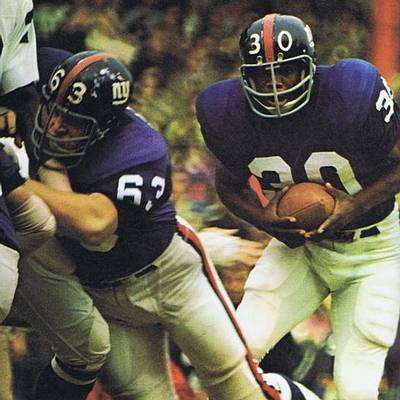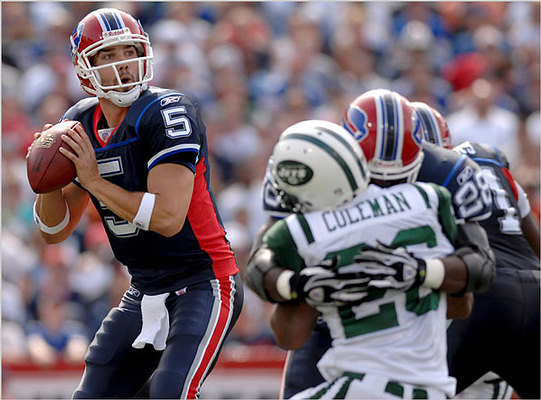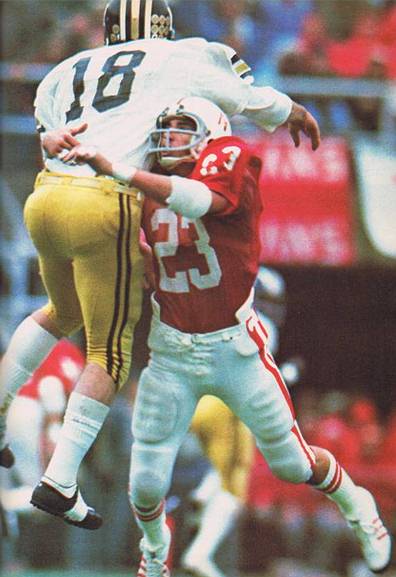

"Quality Of The Game and Butkus"
HELMET HUT NEWS/REFLECTIONS February 2012:
Quality of the Game and Butkus PART I
By Dr. Ken
For
those
who
enjoy
professional
football
and
care
about
the
quality
of
the
game,
it
is
rather
easy
to
consider
and
agree
with
the
criticisms
of
today’s
game
relative
to a
past
era.
I
can
recall
that
in
the
1980’s
and
early
1990’s,
if
one
made
the
comment
that
“Pro
football
players
in
the
past
were
tougher
and
played
a
‘better’
game”
the
usual
retort
would
be
“I
disagree
because
today’s
players
are
so
much
bigger,
faster,
and
stronger”
and
one
would
have
agreed
and
perhaps
conceded
that
the
game
played
from
one
era
to
another
was
comparable
in
quality.
One
rarely
hears
those
arguments
any
longer.
The
absolutely
horrid
lack
of
fundamentals
makes
it
difficult
to
defend
today’s
game
as
“better.”
 |
The N.Y. Giants of the early 1970’s demonstrate basic running game fundamentals
“Basketball on grass” is perhaps a more accurate description of what has become a glorified Seven-on-Seven passing tournament every football Saturday and Sunday. Despite the change in rules that gives enormous advantages to the offensive blockers with extension of the arms and what has become legalized holding, few offensive linemen of this current era could consistently run-block at a barely acceptable level if asked to do so in a 1960’s run-first offense. What seems like WWF choke holds are standard “no penalty” procedures for offensive linemen intent on protecting their quarterbacks as even the “arms extended” blocking rules have not allowed them to consistently curtail the rush of opposing defensive linemen. They also seem content with the knowledge that as long as there isn’t eighteen inches of jersey being pulled from an opponent’s body that they won’t be called for holding, thus, they hold.
 |
On defense its worse. It seems as if anyone who makes what we used to refer to as a “form tackle” is singled out by the analysts as having made “a great tackle.” No, they made a proper tackle, a correct tackle, not a great tackle.
 |
Nebraska DB Kent Smith: head up, hit through the man, wrap!
I have, as a former secondary school educator and administrator placed much of the blame on Sesame Street. Before one wonders how you make the leap from “lack of football fundamentals and absence of tackling skills” to Sesame Street, please consider the following rant. I can recall speaking with the head of the Graduate Department of Special Education at Hofstra University in the winter of 1970 as we discussed a television show that had debuted only months before. The show of course was Sesame Street, supposedly designed to enhance the learning skills of young children, but we both saw and agreed upon what was from our perspective, obvious shortcomings. Still hailed as a significant positive step in pre-school educational preparation, it was and remains my opinion that the quick cuts and multitude of brief segments that focus upon the orienting response of the brain has done little more than add to the inability of most children to properly focus their attention on any singular task. The barrage of sights and sounds, and “cutesy” approaches to presenting material conditioned young children to receive their information in this way and again, in my opinion, opened the door to ESPN and similar types of sports reporting shows which have functioned with a similar format. In fairness to ESPN, movie trailers, television show highlights, and commercials are presented in the same manner, with rapid changes for a multitude of images and of course, to maintain interest, there is accompanying noise and lots of it. Though the cause or causes of the steady decline in educational achievement is the center of constant debate, with genetics, media, and other factors all contributing to the problem, what we have cultivated are two or three generations of adults with increased incident of Attention Deficit Hyperactivity Disorders and related inabilities to pay attention to anything that isn’t presented to them as a sensory Blitzkrieg. Still revered by many educators, Sesame Street has in effect contributed to if not having given rise to an industry of psychological counseling and pharmacology that would be difficult to rival.